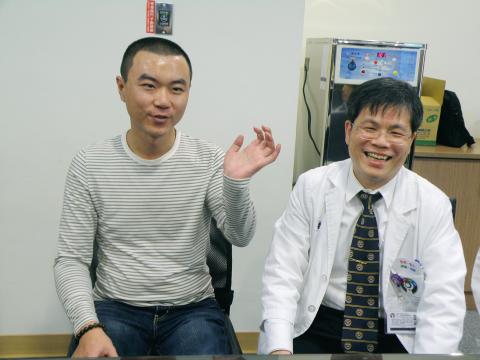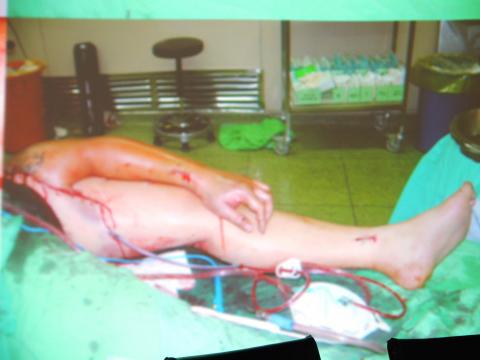Despite falling from a height of five stories three years ago and losing his left arm, a 32-year-old man surnamed Wu (吳) regained the use of this arm through microsurgery replantation procedures. In another case, a reporter regained the use of six fingers that had suffered extreme frostbite.
National Cheng Kung University Hospital (NCKUH) doctor Hsieh Shih-chou (謝式洲) held a seminar on Wednesday to share his two decades of surgical experience. Wu, Hsieh’s former patient, was also present and he was shocked to learn that the actual surgery had been so intense.
Though Hsieh said a similar operation had been performed in Europe in 2006 the European patient lost his limb from around the elbow and there was a shorter limb to replant.

Photo: Meng Ching-tzu, Taipei Times
When Wu was first wheeled into the emergency room, Hsieh said, blood was gushing from his shoulder stump and he was unable to get a blood pressure reading.
The preliminary emergency-room diagnosis showed that Wu suffered multiple fractures of his right arm, bruised lungs and a broken right pelvic bone, and lumbar and thoracic vertebras.
Hsieh said his primary focus was on saving Wu’s life. The arm was nonetheless injected with liquid to preserve arterial conditions before being placed in a cooler for possible replantation.

Photo provided by National Cheng Kung University Hospital
The emergency surgery lasted five hours, between 2pm and 7pm, and with Wu showing stronger vital signs after the surgery, Hsieh decided to attempt to replant the limb, as it was almost past the maximum preservation time for the severed arm.
Although the severed limb was placed in preservation, Hsieh said, the injured area was too large and cellular necrosis usually sets in after six hours of blood deprivation to the limb.
After the five hours of the surgery, added to the time it took to get Wu to hospital, the period for which the limb could be preserved, a maximum eight to 10 hours, was almost up, the surgeon said.
Judging that Wu needed to be in a more stable condition before having the severed arm reattached to his shoulder, Hsieh began heterotopic plantation of the severed limb at approximately 8pm. This meant temporarily replanting the limb onto Wu’s anterolateral thigh to allow blood to flow into the severed limb to prevent cellular necrosis.
The anterolateral thigh is a specific region in the upper thigh housing the anterolateral thigh flap, a construct of the deep muscle fascia with its overlying skin, which is most often used for neck or facial skin transplants.
During the eight days in which Hsieh waited for Wu’s condition to stabilize, the hospital staff debrided the injured area of dead flesh and performed veinal and nerve exploratory surgery to be sure nothing impeded the replantation.
The microsurgery replanting of the severed limb to the shoulder took nearly 10 hours, Hsieh said.
Wu said he was barely conscious the entire time until his arm was replanted, adding that he never actually saw his arm temporarily replanted on his thigh.
“The arm was heavy and numb after I woke up,” Wu said, adding that it was only four months later that he experienced some “drilling pains” through the upper half of the arm, which after inspection was confirmed by the doctor to be the gradual re-growth of the nerve system.
Three-and-half years of rehabilitation later, Wu can now move his wrists from 0 to 90 degrees and can flex his wrists from 0 to 40 degrees, feel heat and cold and can even drive. However, Wu said that he still cannot use his replanted arm to hold heavy items, nor manage more intricate finger motions.
Despite the setback, Wu said that he felt very satisfied, adding the heavens surely looked out for him by not letting him die and for keeping his arm after his fall.
Wu said he was very thankful that Hsieh had not given up on him. He said the experience made him realize how transient life was, giving him the idea of touring the nation, which he has done five times in the past three years.
Commenting on this type of surgery, David Chuang (莊垂慶), director of Linkou Chang Gung Memorial Hospital’s reconstructive microsrugery division and a renowned microsurgeon, said that such surgery was usually very arduous work and had a low rate of success.
Muscles would begin to suffer muscular necrosis after three hours of blood deprivation and a severed limb usually has to be reconnected to the veins as soon as possible, and replanted in its original location within two weeks, Chuang said, adding that the microsurgeon’s technique and the health of the patient were also important factors in the success of the surgery.
“We tried similar methods to replant severed fingers here at Chang Gung Hospital, but unfortunately we did not succeed,” Chuang said.
As there had not been any successful cases prior to the NCUKH case domestically, NCKUH’s replantation of the severed arm was considered “a job well done.”
Another case of successful replantation involved Taipei Times staff reporter Rick Chang (張瑞祺).
In August 2009, Chang visited part of the Tian Shan range bordering Kyrgyzstan and China’s Xinjiang region, but upon descending he discovered that the middle, ring and pinky fingers on both hands were severely frostbitten.
After visiting Linkou Chang Gung Memorial Hospital upon returning to Taiwan, the severity of Chang’s frostbitten fingers caused doctors to amputate the distal phalanges of the six frostbitten fingers, but that still left the problem that the six fingers were more bone than flesh.
According to Chang, the doctor in charge, Chuang Shiow-shuh (莊秀樹), made “flesh pockets” out of the anterolateral thigh flaps on both legs and made Chang place his fingers into the “pockets” to regrow the flesh.
“For approximately three weeks, I was unable to remove my fingers from the ‘pockets’ and every task, from eating, going to the restroom or even scratching, had to be done by nurses,” Chang said.
When Chang was finally allowed to remove his fingers from the “pockets,” the flesh on the affected fingers on both hands had all grown together and was like a meat ball, which Chang described as “Doraemon hands,” referring to a robotic cat that travels back in time from the 22nd century in a popular cartoon named after the character.
Three months later, the doctor finally and separated the fingers, which were further reshaped with reconstructive surgery. Aside from the affected fingers now being shorter and without nails, they have regained 90 percent of their function, Chang said.
Translated by Jake Chung, staff writer

An essay competition jointly organized by a local writing society and a publisher affiliated with the Chinese Communist Party (CCP) might have contravened the Act Governing Relations Between the People of the Taiwan Area and the Mainland Area (臺灣地區與大陸地區人民關係條例), the Mainland Affairs Council (MAC) said on Thursday. “In this case, the partner organization is clearly an agency under the CCP’s Fujian Provincial Committee,” MAC Deputy Minister and spokesperson Liang Wen-chieh (梁文傑) said at a news briefing in Taipei. “It also involves bringing Taiwanese students to China with all-expenses-paid arrangements to attend award ceremonies and camps,” Liang said. Those two “characteristics” are typically sufficient

A magnitude 5.9 earthquake that struck about 33km off the coast of Hualien City was the "main shock" in a series of quakes in the area, with aftershocks expected over the next three days, the Central Weather Administration (CWA) said yesterday. Prior to the magnitude 5.9 quake shaking most of Taiwan at 6:53pm yesterday, six other earthquakes stronger than a magnitude of 4, starting with a magnitude 5.5 quake at 6:09pm, occurred in the area. CWA Seismological Center Director Wu Chien-fu (吳健富) confirmed that the quakes were all part of the same series and that the magnitude 5.5 temblor was

The brilliant blue waters, thick foliage and bucolic atmosphere on this seemingly idyllic archipelago deep in the Pacific Ocean belie the key role it now plays in a titanic geopolitical struggle. Palau is again on the front line as China, and the US and its allies prepare their forces in an intensifying contest for control over the Asia-Pacific region. The democratic nation of just 17,000 people hosts US-controlled airstrips and soon-to-be-completed radar installations that the US military describes as “critical” to monitoring vast swathes of water and airspace. It is also a key piece of the second island chain, a string of

The Central Weather Administration has issued a heat alert for southeastern Taiwan, warning of temperatures as high as 36°C today, while alerting some coastal areas of strong winds later in the day. Kaohsiung’s Neimen District (內門) and Pingtung County’s Neipu Township (內埔) are under an orange heat alert, which warns of temperatures as high as 36°C for three consecutive days, the CWA said, citing southwest winds. The heat would also extend to Tainan’s Nansi (楠西) and Yujing (玉井) districts, as well as Pingtung’s Gaoshu (高樹), Yanpu (鹽埔) and Majia (瑪家) townships, it said, forecasting highs of up to 36°C in those areas